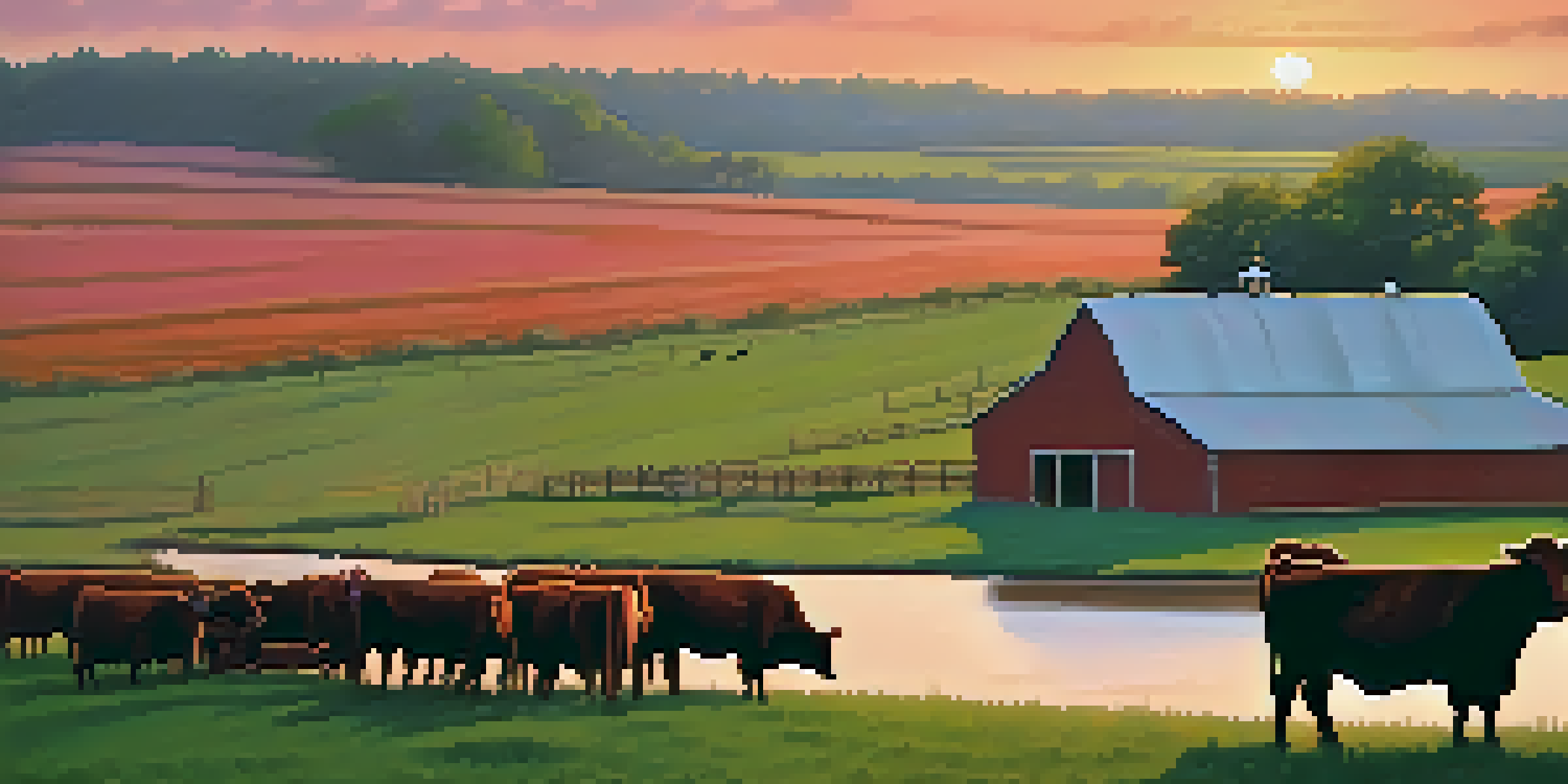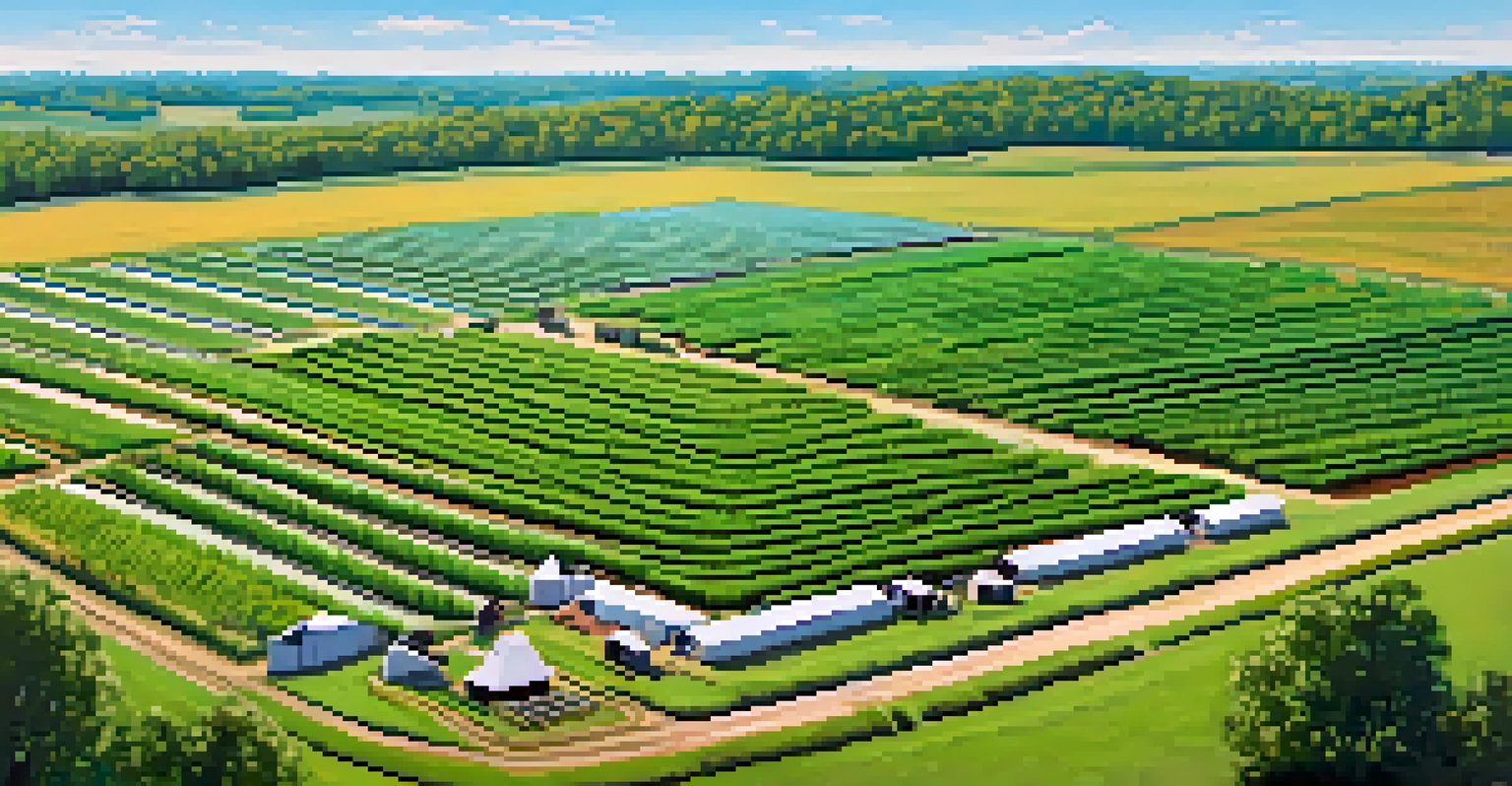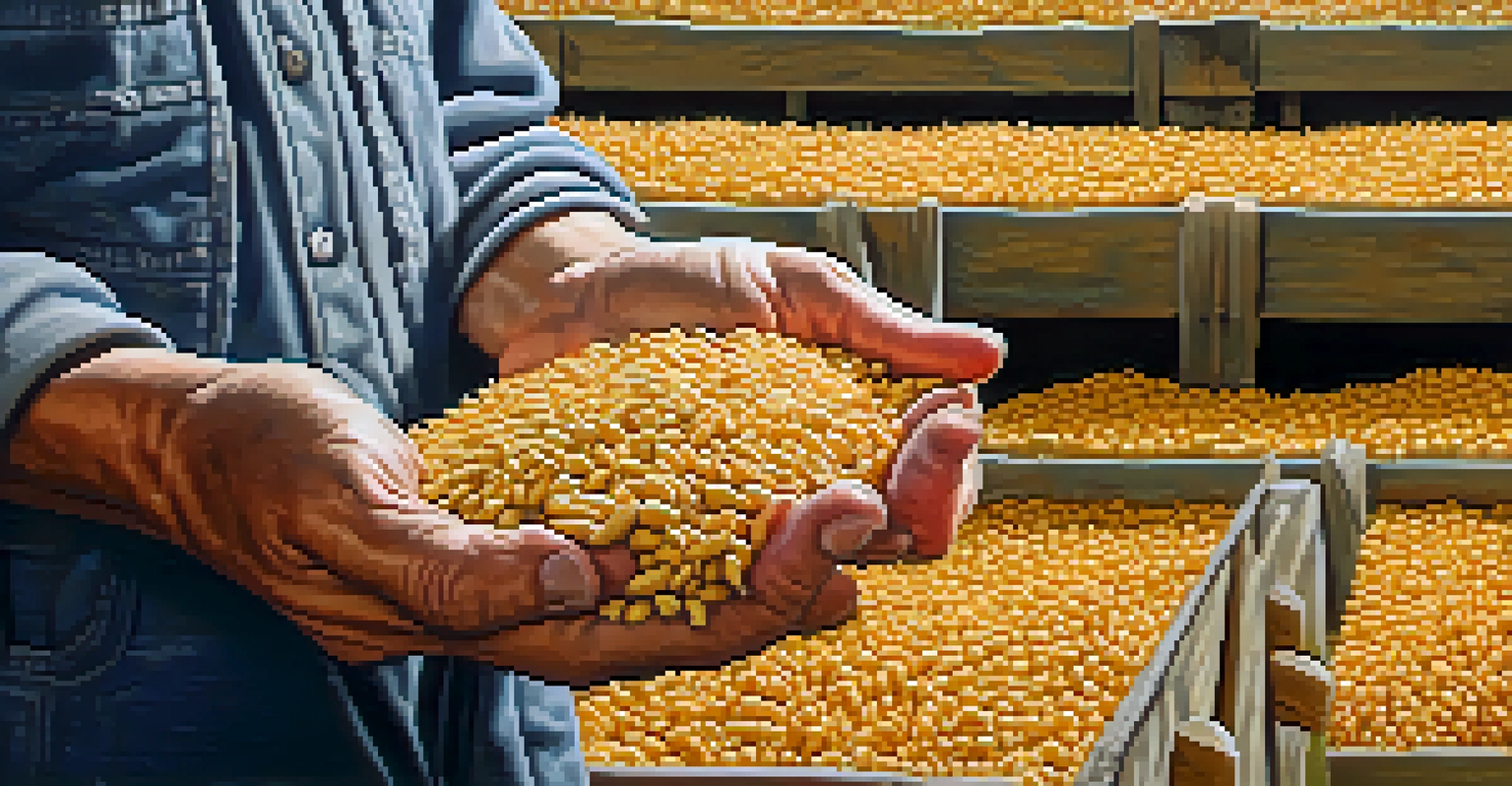Livestock Farming in Missouri: Trends and Economic Roles

Overview of Livestock Farming in Missouri Today
Livestock farming in Missouri plays a crucial role in the state's agricultural landscape. With a diverse range of animals including cattle, hogs, and poultry, Missouri stands out as a significant contributor to the national livestock market. This sector not only supports local economies but also provides employment opportunities for thousands of residents.
Agriculture is the foundation of our country's economy and the heart of our communities.
In recent years, livestock farming has evolved, incorporating new technologies and practices. Farmers are increasingly adopting sustainable techniques that enhance productivity while caring for the environment. This shift reflects a growing awareness of the need for responsible farming practices in an era of climate change.
Moreover, Missouri's strategic location in the Midwest allows for easy access to major markets and transportation networks. This geographical advantage further boosts the livestock industry, making it a vital player in both state and national economies.
Key Livestock Types and Their Contributions
Missouri is renowned for its beef cattle production, ranking among the top states in the country. The state's rich pastures and favorable climate create ideal conditions for raising high-quality beef. Additionally, the beef industry generates significant revenue, impacting both local farmers and the broader economy.

In addition to beef, Missouri has a robust hog farming sector, which is another critical component of its livestock industry. The state's hog farmers contribute to a thriving pork market, which is essential for food production and export. This not only boosts local economies but also enhances Missouri's reputation as a leading state in pork production.
Missouri's Livestock Industry Impact
Livestock farming significantly boosts Missouri's economy by providing jobs and supporting local communities.
Poultry farming is another key player in Missouri's livestock arena, with broilers and turkeys being the primary focus. The poultry industry has seen tremendous growth, providing jobs and contributing to food security. Together, these livestock types form a diverse and resilient agricultural sector.
Economic Impact of Livestock Farming in Missouri
The economic contributions of livestock farming in Missouri are substantial, reaching billions of dollars annually. This sector stimulates local economies through job creation, supply chains, and related industries like feed production and veterinary services. The ripple effects of livestock farming can be felt in various sectors, highlighting its importance.
Sustainable agriculture is a way of farming that can be maintained indefinitely without damaging the environment.
Furthermore, livestock farming supports rural communities by providing stable income sources for farmers and their families. Many communities depend on the success of this industry for their livelihoods, fostering a sense of interdependence among local businesses and residents. This interconnectedness strengthens community ties and promotes local growth.
As global demand for protein continues to rise, the economic role of livestock farming in Missouri is likely to expand. Farmers are increasingly focusing on improving production efficiency and sustainability, ensuring that the industry remains competitive and resilient in the face of challenges.
Emerging Trends in Livestock Farming Practices
Recent trends in livestock farming showcase a shift towards sustainability and animal welfare. Farmers are increasingly adopting practices that prioritize the health of their animals and the environment, such as rotational grazing and organic feed. These methods not only benefit the animals but also appeal to consumers who are more conscious of their food choices.
Technology also plays a significant role in modern livestock farming. Innovations such as precision agriculture and data analytics allow farmers to monitor animal health and optimize resources effectively. Embracing technology not only boosts productivity but also helps in making informed decisions that enhance farm management.
Sustainability in Farming Practices
Farmers in Missouri are increasingly adopting sustainable practices and technology to enhance productivity and animal welfare.
Lastly, consumer preferences are steering the industry towards transparency. Many shoppers today want to know where their food comes from and how it’s produced. Missouri farmers are responding by sharing their practices and stories, building trust with consumers and fostering a deeper connection between producers and eaters.
Challenges Facing Livestock Farmers in Missouri
Despite its successes, livestock farming in Missouri faces several challenges. Market fluctuations, driven by factors like trade policies and consumer demand, can significantly impact farmers' profitability. Sudden changes in these markets can create uncertainty, making it difficult for farmers to plan for the future.
Additionally, environmental concerns such as water quality and land use are pressing issues for livestock farmers. Balancing agricultural production with environmental stewardship is essential but often challenging. Farmers must navigate regulations while implementing sustainable practices that protect natural resources.
Lastly, labor shortages pose a significant challenge in the livestock industry. Finding skilled workers who are willing to work in agriculture can be tough, especially as the industry demands more advanced skills. Addressing these labor issues is crucial for the long-term viability of livestock farming in Missouri.
The Role of Government and Policy in Livestock Farming
Government policies play a pivotal role in shaping the livestock farming landscape in Missouri. Programs supporting research, education, and subsidies can significantly impact farmers' ability to thrive. By providing resources and guidance, policymakers can help farmers adapt to changes and enhance their operations.
Moreover, regulations regarding animal welfare and environmental standards aim to ensure sustainable practices. While these regulations are essential for protecting resources and animal rights, they can also be challenging for farmers to navigate. Striking the right balance between regulation and support is key to fostering a healthy livestock industry.
Challenges for Farmers Ahead
Market fluctuations, environmental concerns, and labor shortages present ongoing challenges for livestock farmers in Missouri.
Additionally, collaboration between farmers, government agencies, and industry organizations can lead to innovative solutions. By working together, stakeholders can address challenges and capitalize on opportunities, ensuring the continued success of livestock farming in Missouri.
Future Outlook for Livestock Farming in Missouri
Looking ahead, the future of livestock farming in Missouri appears promising, yet requires adaptability. As trends shift and consumer preferences evolve, farmers will need to remain flexible and open to change. Embracing innovation and sustainability will be vital to maintaining competitiveness in the market.
Moreover, the increasing focus on local food systems presents a unique opportunity for Missouri farmers. By connecting directly with consumers through farmers' markets and local sales, farmers can build community relationships while enhancing their economic viability. This trend aligns well with the growing desire for transparency in food production.

Ultimately, as Missouri's livestock farming sector evolves, it will be essential for farmers to continue learning and adapting. By leveraging technology, embracing sustainable practices, and collaborating with stakeholders, they can ensure a resilient and thriving industry for years to come.